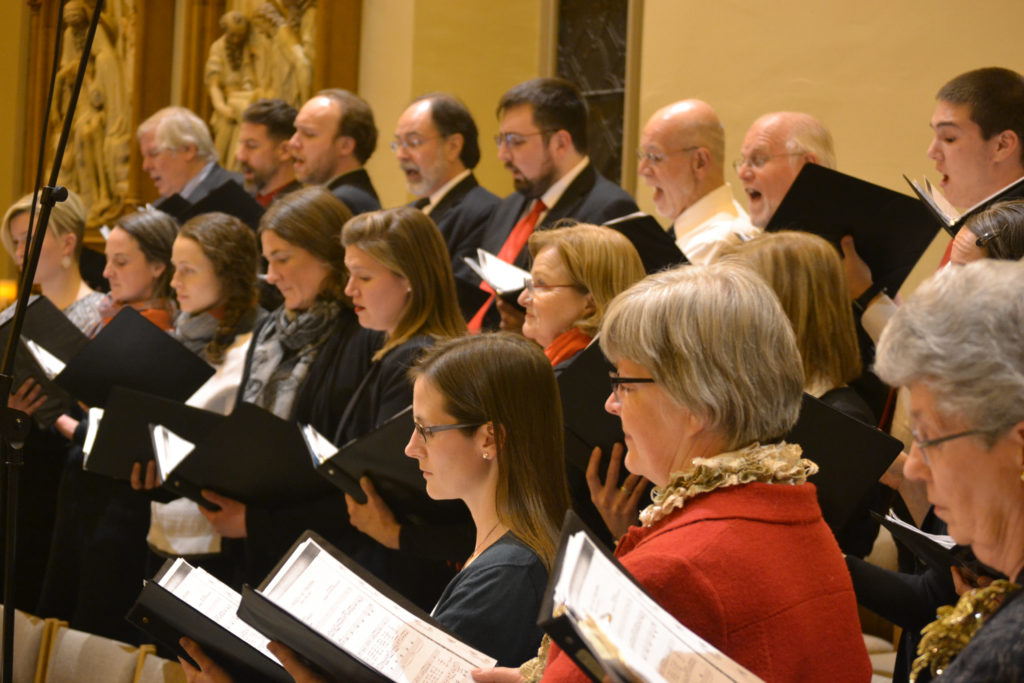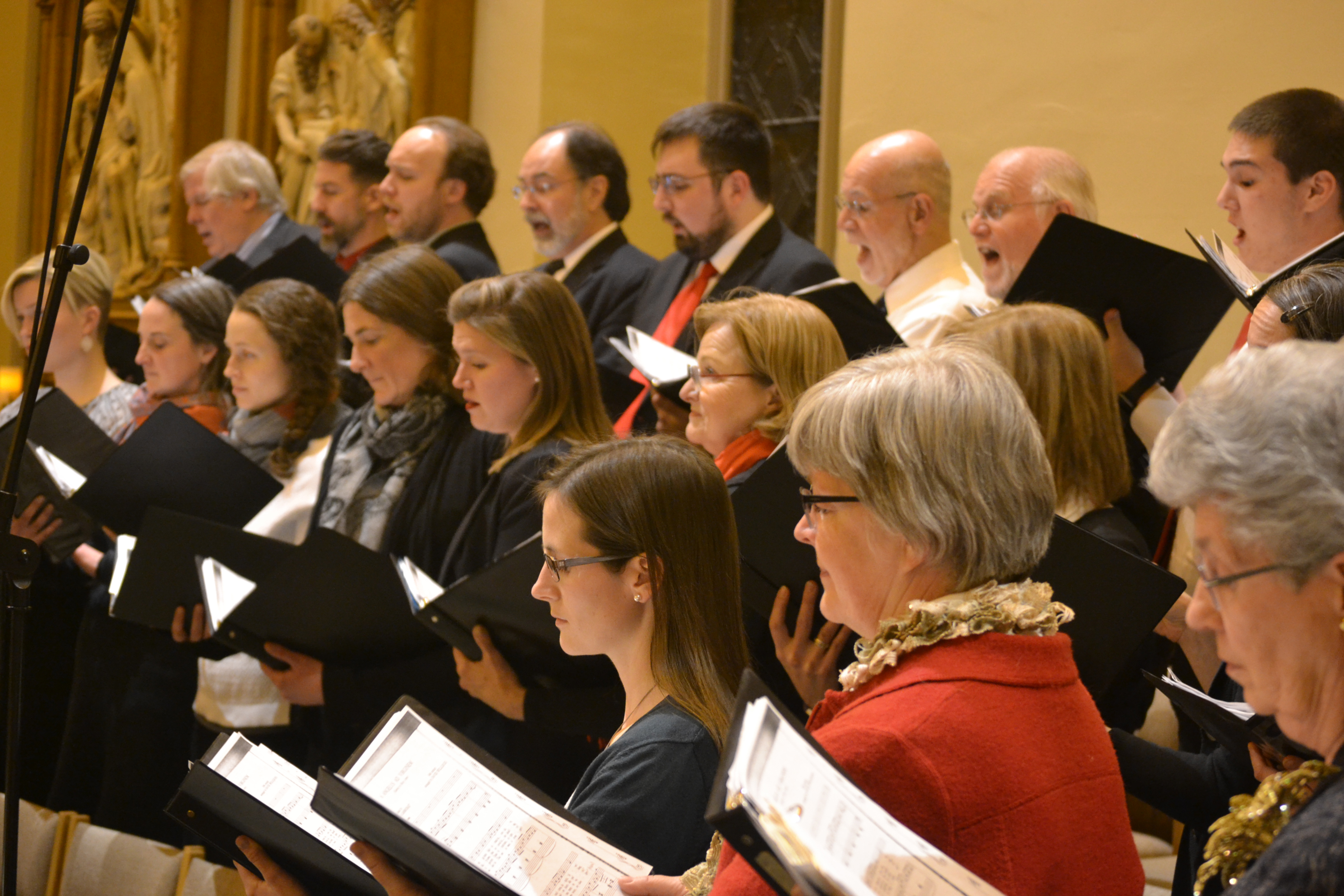By Dan Russo
Catholic News Service
DUBUQUE, Iowa (CNS) — Jim Mendralla, liturgy and music director at St. Raphael Cathedral in Dubuque, believes passionately in music’s ability to bring humanity closer to God.
That’s why, with the help of a choir of talented singers, he has been bringing the Lessons and Carols program to the cathedral for the past seven years.

At this season’s event scheduled for Jan. 4, the performance will have a unique personal aspect to it, since it will feature a relationship of artists of three different generations.
Mendralla was an important influence on John Gaffney, a nationally published Catholic composer. Gaffney, a Wisconsin native, will be debuting his new choral arrangement of “Ave Maria,” dedicated to his mentor, and plans to attend the event.
Also, Mendralla is dedicating the performance to Fr. Ron Gollatz of the Archdiocese of Chicago, his own mentor and friend, who encouraged his calling to a life of music ministry. The priest died in 2018.
Gaffney set this other Marian song to a choral anthem.
“This was the easiest and one of the fastest pieces I have ever composed. The Spirit was definitely at work helping me to compose this piece. Ron got to hear it before he died and it was sung at his funeral,” Gaffney wrote in a reflection about each anthem.
“Prayer to Mary” should sound lush and “heavy” (which can be achieved with a strong bass section). Each of the three soprano solos should be gentle yet sound urgent and cut through the choirs “Oohs”. Tall vowels is a must in this piece.
“Good choral music has a way to open a door to people’s spirituality and cultural sense … and if they’re not exposed to that, they lose the opportunity to be enriched in a very deep way,” said Mendralla. “If someone is not pulling these gorgeous pieces out and exposing people to them, then we all lose. I feel a mission to bring to light these amazing compositions that these musicians have been divinely inspired to write.”
Mendralla attended St. Emily Parish in the suburbs of Chicago when he was growing up, and Fr. Gollatz, pastor, and Paula Gliot, the music director, noticed Mendralla’s talent for the organ and other instruments and encouraged him.
“They were both the ones who said to me, ‘Go, you have a vocation, study and do what you need to do,'” recalled Mendralla.
After getting a degree from Benedictine University in Lisle, Illinois, Mendralla took his first post at a parish in Buffalo Grove. Fr. Gollatz kept helping him develop his talent, and that’s where the newly minted music director met Gaffney.
“When I was in high school, he was in his first parish out of college and I was his assistant at the parish,” said Gaffney. “He was really my first mentor in liturgical music. Then he switched parishes in Chicago, and I went with him.”
Gaffney eventually studied for degrees in music and theology and headed off for a parish position in California. Mendralla eventually took the position at the cathedral. When he was a parish music director, Gaffney began composing musical arrangements of lyrics, many times out of necessity. One day, Gaffney was trying to prepare a volunteer choir at this parish for a performance, and he knew he had to act quickly.
“It was the last rehearsal we had before the solemnity of the Ascension of the Lord and the choir was working on a really cool piece for the Ascension, and I knew they would not have it ready with one rehearsal left,” recalled the 38-year-old. “I composed a new piece for the Ascension in my office in about an hour, and it was a piece that was easy enough for the choir to learn in one rehearsal. It was really well received. It was published and it’s the best-selling piece that I have published.”
Hear a snippet of the song, “Our God Has Gone Up”
GIA Publications, a national liturgical music publisher, started picking up the composer’s work several years ago. His arrangements are performed in churches around the country.
Gaffney had to leave parish ministry primarily for health reasons. This has been difficult, but Mendralla believes there have been some positive developments from it.
“John has been writing more,” said Mendralla of his mentee. “He has an illness that can be pretty debilitating, but out of his illness comes some of his best composition, because it’s a way for him to heal, to cope with pain and suffering.”
Gaffney reflected that being a church composer has actually increased his connection to God, even during his current health crisis.
“I was actually just very ill,” he recalled. “I had to have surgery and was in a lot of pain for about three weeks. All (the music I was working on) kept running through my brain. I couldn’t stop hearing those (musical) pieces. … All the pieces are basically Scripture, and some Scripture just sticks in your brain. That’s why the Roman liturgy is intended to be sung. There was no spoken Scripture that was running through my brain at all, just all (Scripture sung at) the liturgy.”
Gaffney will be flying in for the musical event in Dubuque and plans to attend with some of his family. Mendralla said he is looking forward to seeing him.
“I’m very proud of (John) and what he’s accomplished — his high standards; his love for the liturgy and his real attention to the detail of the sacred and the senses of the sacred,” he said.







